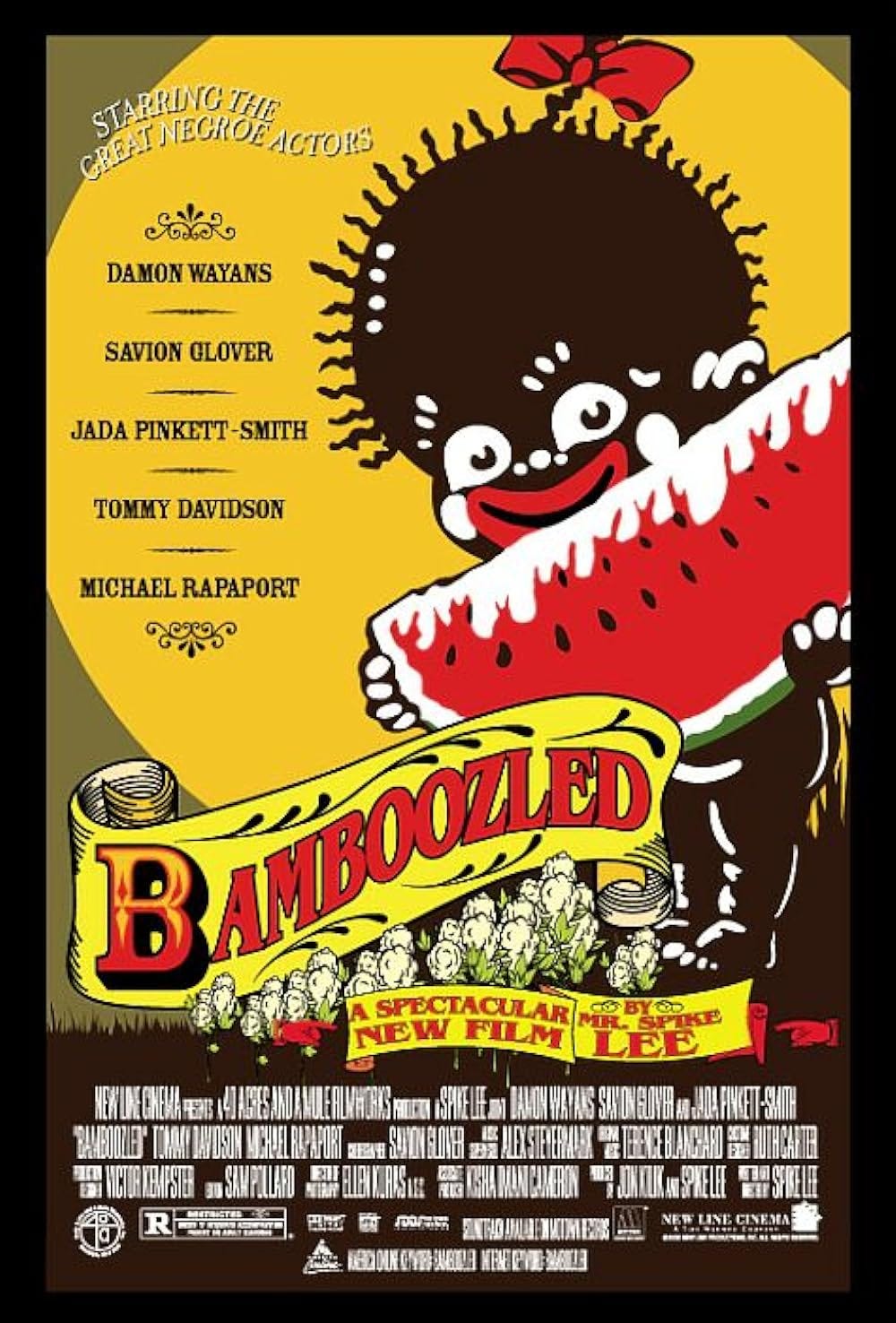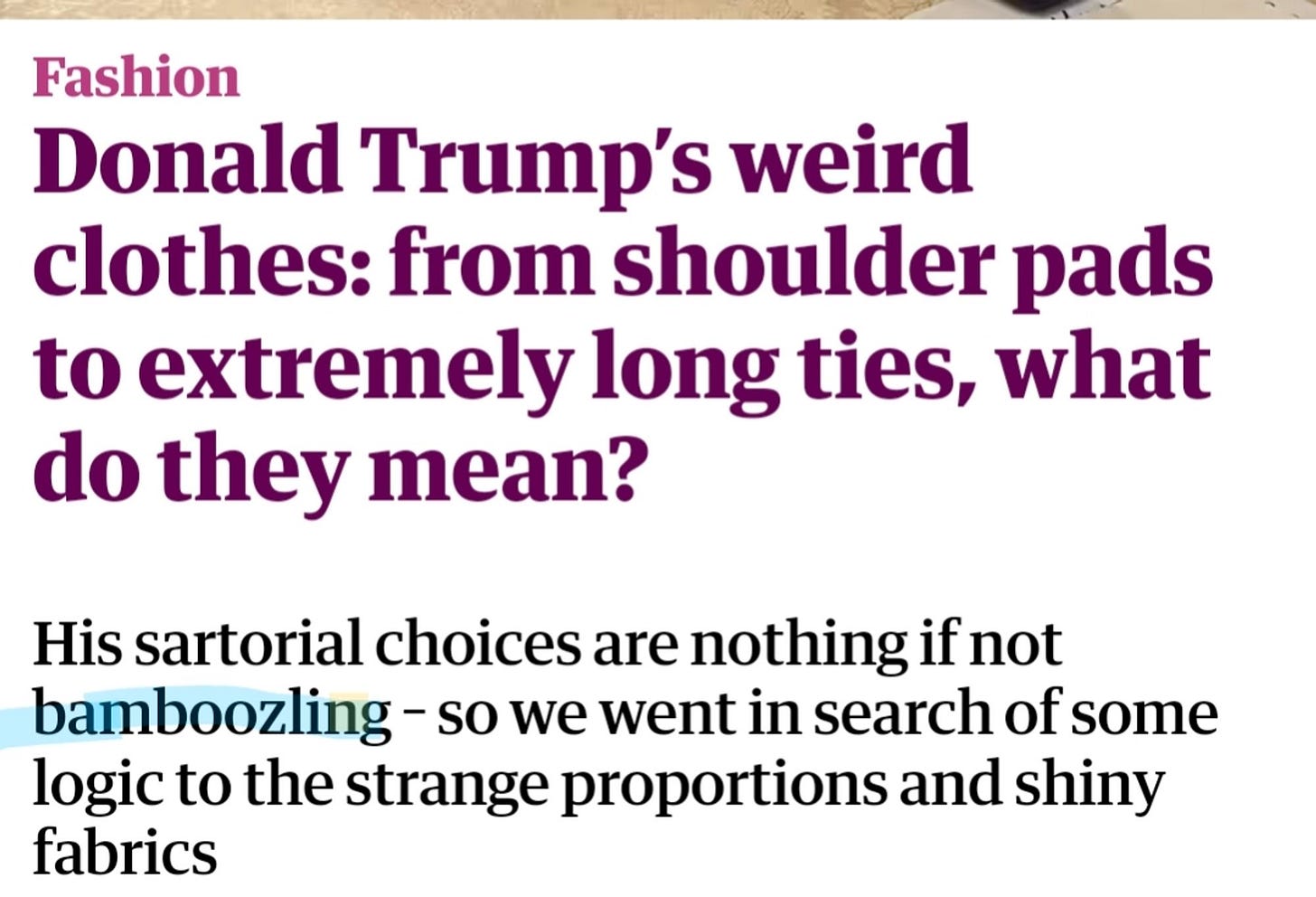Bamboozled by bits and bobs
In which I am annoyed, then confused, then humbled.
You know the feeling. You’re browsing online and your eye alights on some word or expression that strikes you as so peculiar, so muddled, so wrong, that you simply cannot let it pass without a howl of protest.
It happened to me last week. Twice. In both cases the issue was British English: They (Brits) are doing it wrong! We (Yanks) are doing it wrong!
Except, oops. This time, the wrongness was (mostly) my own.
Here’s the first thing that set me off. It’s from an August 15 story in The Guardian by Zoe Williams about “Donald Trump’s weird clothes”1. I’ve highlighted the word in the subhed that confounded me: “His sartorial choices are nothing if not bamboozling.”
I’d never considered the possibility of clothing being “bamboozling.” To American me, to bamboozle means only “to hoodwink,” “to trick,” “to swindle,” “to con.” The wearer of the clothes may be (and in this case definitely is) a bamboozler. His jackets and ties? As Ralphie Wiggum would say, that’s unpossible.
Haha, I thought. Those silly Brits: They’d taken a good old Americanism and slapped it onto a piece of fashion commentary without checking its meaning.

How wrong was I?
Bamboozle is not an Americanism; it only sounds like one. (Compare bodacious, discombobulate, and other wonderful 19th-century words that I cited in my post on faze.) Bamboozle first appeared in print in 1702 in England.
Yes, bamboozle originally meant “to hoax” or “to trick,” but — get this — it also meant “to confuse.” The OED gives “to mystify, perplex, confound” as the second sense of bamboozle, a sense first recorded, according to
’s Dictionary of Slang, in a 1710 issue of Tatler as an example of “the continual Corruption of our English Tongue.” The author was Jonathan Swift. Peevers have been peeving for centuries.Nor did that sense of “confuse” or “mystify” fade away in the 18th century. I checked in with Lynne Murphy, the American-in-England linguist and author of The Prodigal Tongue: The Love-Hate Relationship Between American and British English. Yep, she said (via email): totally kosher. Something like a necktie could be bamboozling — “confusing or misdirecting” — “because it’s really busy/overwhelming.” She found several other examples for me, including, “the often bamboozling language of shorthand.” I would never use bamboozling that way, but then — again — IANAB (I am not a Brit).
For what it’s worth, the very American Merriam-Webster also gives “to confuse, frustrate, or throw off thoroughly or completely” as the second sense of bamboozle. And it gives a thoroughly American example sentence that nevertheless sounds weird to me: “a quarterback bamboozled by an unexpected defense.” I’d argue that this bamboozled here could mean “fooled” or “deceived,” but I know better than to argue with M-W.
So all right, The Guardian. You get a pass . . . and an award for putting me in my (American) place.
My second “Someone is wrong on the internet!” experience came from a U.S. source: the home-design publication Dwell2, which is based right across the bay in San Francisco. The story, headlined “Dwell on This: Get Behind the Bidet,” was originally published in 2020, but Dwell chose to re-serve it to me, perhaps because its algorithm has sensed my fervent bidet advocacy.
I stopped short before I finished the first sentence:
When it comes to daily rituals, Americans are perplexingly shy about washing their bits and bobs in the bathroom . . .
(Emphasis added.)
In this case, I recognized bits and bobs as a Britishism that a few American writers have adopted; it’s more naturally idiomatic for an American to say “bits and pieces.” (See Ben Yagoda’s analysis of “bits and bobs,” from 2018, here.) But I felt pretty certain that no one, on either side of the pond, would refer to the nether parts of human anatomy as “bits and bobs” — bits, maybe (as in “private bits” or “naughty bits”), but not bobs.
Well, once again Lynne Murphy and Jonathon Green set me straight. Sort of.
Here’s Lynne, via email: “It's very usual in BrE to refer to genitals as one's ‘bits’. The ‘and bobs’ is not usually used in that context, but could be taken as a humorous extension.”
And here’s Jonathon, in an entry for “the female genitals” in GDoS: “Roger’s Profanisaurus in Viz Apr. 47: wetter than a cod’s wetsuit. Descriptive of a woman’s bits and bobs when she’s dripping like a fucked fridge. Also otter’s pocket.” TMI, Jonathon. TMI.
So . . . maybe this usage is acceptable. But I have my doubts.
Why? Because the author, Gregory Han, appears to be American. (I looked him up on LinkedIn; he attended UCLA and UC Irvine.) With “bits and bobs” he may have been reaching a little too far for something, well, very demure, very cutesy. (At least he didn’t say “bits and Bob’s your uncle.”)
Bit, by the way, is one of those English words with almost limitless senses. (Not as many as set, but still.) Ben Yagoda — who has a book coming out next month about “the British invasion of American English” — has devoted at least eight blog posts to various shadings of bits, including “juicy bits” and “dangly bits.” In American slang, a bit was a hypothetical coin valued at one-eighth of a dollar. (Did anyone else chant “Two bits, four bits, six bits, a dollar / All for [our team], stand up and holler!” at high school football games?)
One of my favorite bit stories comes from The Method, Isaac Butler’s recent history of Method acting. Americans learned the Method from Russians, who struggled with English vowels. When Russian teachers tried to explain Method pioneer Konstantin Stanislavski’s concept of a bit — any change within a scene — it came out beat. And beat is the word American actors have used ever since.
I love that name.




For those of us in the UK of a certain vintage, Bamboozle is inextricably linked to the Teletext game of that name that we played using our TV remote controls! It is definitely more commonly associated with the second meaning for us, I would venture.
https://en.m.wikipedia.org/wiki/Bamboozle!
Love this post, Nancy!
If it's any comfort, I am annoyed, then confused, then humbled most days. Often more than once.